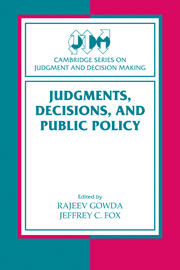Book contents
- Frontmatter
- Contents
- Contributors
- Acknowledgments
- Introduction
- Part I The Fundamentals of Behavioral Decision Theory
- 1 Judgment and Decision Making: Extrapolations and Applications
- 2 Some Morals of a Theory of Nonrational Choice
- 3 Cognition, Intuition, and Policy Guidelines
- Part II Economic Applications and Contrasts
- Part III Applications to Political and Legal Processes and Institutions
- Part IV Other Policy Applications
- Part V Commentary and Cautionary Note
- Index
1 - Judgment and Decision Making: Extrapolations and Applications
Published online by Cambridge University Press: 11 January 2010
- Frontmatter
- Contents
- Contributors
- Acknowledgments
- Introduction
- Part I The Fundamentals of Behavioral Decision Theory
- 1 Judgment and Decision Making: Extrapolations and Applications
- 2 Some Morals of a Theory of Nonrational Choice
- 3 Cognition, Intuition, and Policy Guidelines
- Part II Economic Applications and Contrasts
- Part III Applications to Political and Legal Processes and Institutions
- Part IV Other Policy Applications
- Part V Commentary and Cautionary Note
- Index
Summary
People who make or implement public policy must often estimate prob-abilities, predict outcomes, and make decisions that affect the welfare, values, and lives of many others. Until recently, many of the disciplines that study policy employed a model of individuals and organizations as rational agents whose predictions conform to the prescriptions of probability theory and whose actions maximize their expected gains in conformity with classical decision theory.
Such theories lead a double life. They are sometimes viewed as nor-mative models that tell us what we should do in order to be rational (even if we rarely manage to pull it off). Construed this way, they offer advice: We should have logically consistent beliefs, coherent probability assign-ments, and consistent preferences, and we should maximize expected utilities. But these same theories have also been viewed as descriptive models; construed this way, they are meant to provide an approximate characterization of the behavior of real people. It is this interpretation that has played a central role in economics, management science, and parts of political science, sociology, and the law.
Since the early 1970s, this descriptive picture of judgment and de-cision making has come under increasing attack from scientists work-ing in behavioral decision theory, the field concerned with the ways in which people actually judge, predict, and decide.
- Type
- Chapter
- Information
- Judgments, Decisions, and Public Policy , pp. 9 - 45Publisher: Cambridge University PressPrint publication year: 2001



